Reaction as HS2's second phase details unveiled
- Published
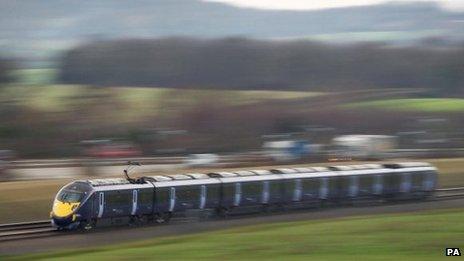
Details of the proposed next phase of the £32bn HS2 high-speed rail network have been unveiled by the government, with the plan to eventually link London with Birmingham, Manchester and Leeds.
Supporters suggest the cut in journey times between London and other cities will bring major economic benefits, particularly to the north of England and the Midlands. Critics argue that HS2's predicted benefits have been over-estimated by the government, and suggest swathes of picturesque countryside will be blighted by the railway.
Here is some of the reaction from across the country to the details of the route's proposed second phase. , external
Greater Manchester
Two new stations will be built at Manchester and Manchester airport under the plans. Sir Richard Leese, leader of Manchester City Council, said HS2 was a "once-in-a-generation opportunity [which] will unlock the economic potential of the North West".
Salford Mayor Ian Stewart said: "This investment will bring growth, jobs and prosperity to the region that the people of Salford will be a part of.
"This world-class travel system will help to solidify Salford and the wider region's place as an emerging economic powerhouse."
The chairman of the Transport for Greater Manchester Committee, Councillor Andrew Fender, said: "Today's announcement isn't just about faster trains - high-speed rail will create up to 30,000 station-supported jobs in Manchester and help to drive productivity in the region, bridging the economic gap between the North and the South."
Leeds
Leeds will also get a new station under the HS2 plans and Leeds City Council leader Keith Wakefield said: "We have lobbied long and hard for a high-speed rail link to Leeds and this is excellent news.
"It will strengthen Leeds' position as the northern transport hub and unlock major investment, jobs opportunities and connectivity to the rest of the country."
But the Labour councillor added: "The proposed station... will only work if the interchange links directly into Leeds station and comes with a significant government package of investment in its infrastructure, road and rail links to the rest of the city region area."
York area
The preferred HS2 route would also take high-speed trains to the Church Fenton area and onto York, 10 miles (16km) away. Journeys from York to London would be cut to 83 minutes. The quickest journey currently is just under two hours.
James Alexander, leader of the Labour-run City of York Council, said the project was key to securing the city's economic future.
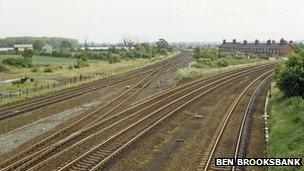
The preferred route would take high-speed trains to Church Fenton, about 10 miles (16km) from York
"This commitment to the next phase of the HS2 programme means that York is set to realise real economic benefits upon its completion," he said.
"With access to the country's capital in just 83 minutes, York will become an even greater hub for tourism and business. We now need to work to capitalise on today's announcement, which provides a further boost in confidence to York as a city to invest."
But Andrew Mason, from Church Fenton Parish Council, said he thought the project would "blight the village".
He said: "If you look at the route... we're a lovely village at the moment. We have got a rural background and this will completely decimate it and create an urban island. I am sure when we have consulted with the village, everybody will take the view that it's just not going to happen."
Sheffield
A new station linking Sheffield with the HS2 high-speed rail network will be situated at Meadowhall shopping centre. Journey times from Sheffield would be 38 minutes to Birmingham and 69 minutes to London.
Deputy Prime Minister Nick Clegg, who is the Liberal Democrat MP for Sheffield Hallam, said building a station outside the city centre was the right option.
"The city centre option is not a cost-free one. It would be a lot more expensive and also the train link would be slower, which slightly defeats the purpose of the whole exercise," he said.
Mr Clegg said a route in central Sheffield would have cut through a 4,000-home community housing development, the state-of-the-art advanced manufacturing park in Rotherham and a stretch of ancient woodland.
But Paul Blomfield, the Labour MP for Sheffield Central, said the station should be built in the city centre.
"This is the biggest investment in the railways north of London for 120 years, so we've got to get it right," he said.
Bryan Mason said he was "absolutely devastated" to find out the line would go through his Hoyland farm
"The case for HS2 is about improving connectivity between our great cities. An independent study has shown that a city centre station would bring between £2bn and £5bn more into the local economy, compared to Meadowhall, and create 6,500 extra jobs.
"I'm disappointed ministers have ignored this evidence."
Tim Hale, chairman of the Sheffield Chamber of Commerce's transport forum, said: "While some may wish to have seen it closer to Sheffield city centre, on balance, the connectivity of Meadowhall to the whole of the city region is probably better.
"Now the government must address the resulting issues. It is important that those who are negatively affected by the announcement have their fears dispelled quickly."
One farmer based near Hoyland, Barnsley, said he was "absolutely devastated" when he saw the proposed route.
Bryan Mason, who has recently opened a shop at Park Side Farm, said: "We've just got open and then this happens. The map shows it going through the business, the house, everything."
East Midlands
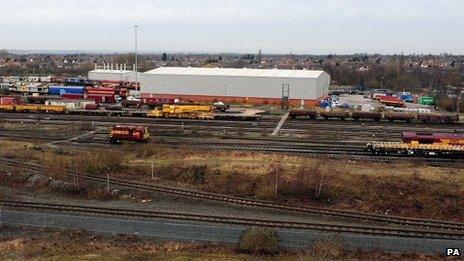
The next phase of HS2 will pass through the East Midlands, creating an interchange at Toton sidings (pictured above) serving Derby and Nottingham, but Nottinghamshire Better Transport, which is part of the national Campaign for Better Transport, is strongly against the project.
Chairman David Thornhill said: "I have rarely come across such an environmentally catastrophic scheme that is so pointless and so wasteful of money."
However, Richard Jackson, chairman of Nottinghamshire County Council's transport and highways committee, said the announcement was "good news for the economy of Nottinghamshire and the region as a whole".
He added: "Improving the transport infrastructure is critical for unlocking the full potential of business in our county."
The government said passengers would be able to travel from Toton to London in 51 minutes and Birmingham in 19 minutes. A regular shuttle service from Nottingham city centre would take 12 minutes.
The decision has raised eyebrows, with some suggesting the station should have been located in the nearby cities of Derby or Nottingham.
"Even people in Nottingham haven't heard of Toton," admitted David Watts, a councillor for Broxtowe Borough Council, which covers Toton.
But he added: "All the political parties in Broxtowe have been asking for it to be here. It's going to bring jobs and development to the area which we are very pleased about."
Leader of Derby City Council Paul Bayliss said HS2 was good for the region's economy but it would generate about £440m if the station was in Nottingham or Derby - £110m more than it would in Toton.
MP for Derby North Chris Williamson broadly welcomed the project but said the station was in "no-man's land".
Campaigners
Penny Gaines, chairwoman of the Stop HS2 campaign, said the group believed the project was "fundamentally flawed".
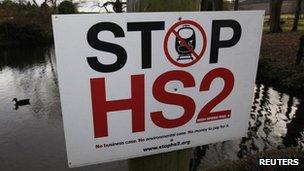
The first phase of the project faced opposition from dozens of groups
"The government talks about jobs, and regenerating the North, but in reality, high-speed rail projects elsewhere have sucked jobs to the capital cities, away from the regions. HS2 focuses on long-distance journeys, when the main passenger growth is in regional and local areas.
"[HS2] should be cancelled as soon as possible, so that we can concentrate on developing the transport infrastructure that will bring more benefits to more people than a fast train for fat cats."
Ms Gaines added: "HS2 is a London-centric proposal that seems focused on extending the London commuter belt beyond Birmingham, when we need to create an engine for growth in the North, providing access to jobs for people who want to live and work in the North.
"Proponents of HS2 don't seem to realise that people can already live anywhere in the UK and telecommute to anywhere else in the world. It's yet another example of outmoded thinking that ignores digital technologies, which will be the real wealth and job creator in the 21st century."
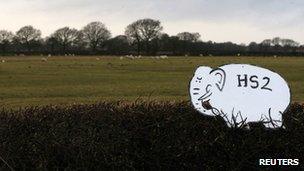
Campaigners make their feelings known in the Cheshire countryside
Matthew Sinclair, chief executive of the TaxPayers' Alliance, which campaigns for better value for money from public spending, said: "The government is deluding itself if it thinks spending vast sums of taxpayers' money on this white elephant is a substitute for a genuine plan for growth."
He added: "The HS2 business case just isn't credible and ministers aren't being honest about the hidden costs or flawed projections that the project is based on. This is a rich man's train line which every family in Britain is paying a fortune for.
"The government must look to strategic alternatives that could deliver greater capacity more quickly and without the enormous bill."
Politicians
George Osborne: "I think it is the engine for growth in the north and the midlands"
Prime Minister David Cameron told the BBC the project was "one of the best answers to healing the north-south divide. It will bring growth to our great northern cities. Most countries are getting on board the high-speed rail express and we should be doing that too."
Defending the timescale of the project, he added: "It is difficult to get things built in a modern, industrial democracy like Britain, that is why we need to get going now."
Chancellor George Osborne said the HS2 project would be "the engine for growth in the North and the Midlands of this country".
Mr Osborne, whose Tatton constituency in Cheshire is among the places phase two of the route will pass through, said: "If our predecessors hadn't decided to build the railways in the Victorian times, or the motorways in the middle part of the 20th Century, then we wouldn't have those things today."
However, the government is facing some dissenting voices from backbench Conservative MPs whose constituencies the rail link will pass through.
Andrew Bridgen MP: "I have no confidence in their consultation process"
Andrew Bridgen, who represents North West Leicestershire, said: "We are going to have all of the pain and none of the gain. It is going to cut my constituency north to south, destroy lots of countryside and put the fear and planning paralysis into a lot of my communities."
Dan Byles, the Conservative MP for North Warwickshire and Bedworth, tweeted: "It's a bad day for North Warwickshire with the publication of #HS2 phase 2. Unsurprising, but devastating."
Mr Osborne was warned he faced protests from constituents in his Cheshire constituency of Tatton.
Michael Fabricant, Tory MP for Lichfield, which will be affected by HS2, told BBC Radio 4's World at One programme: "The problem is that this route plunges through countryside which is at the moment unblemished by either major roads or by rail.
"Now that they are opening up the route to Manchester and to Leeds, there will be people along that route, Members of Parliament, who will be lobbied very heavily indeed by their constituents, including, incidentally, George Osborne, who hasn't yet had this problem."
The project is supported in principle by Labour, but it has warned about its timetable slipping.
And shadow transport secretary Maria Eagle added: "I think it's tremendously important that we link our airports to our cities, not some station in the middle of nowhere near a city and bypass our main hub airports.
"So I think there are questions to be asked and we will be asking them, but overall this is a good thing for the country and we need to get on and give certainty."
The Scottish Government said it would be pressing for a concrete timetable of plans to extend HS2 to Scotland as the full benefits could be realised only if Scotland was involved.
Shadow Scottish secretary Margaret Curran said the announcement did not offer enough for people in Scotland, which needed to join the high-speed network "sooner rather than later".
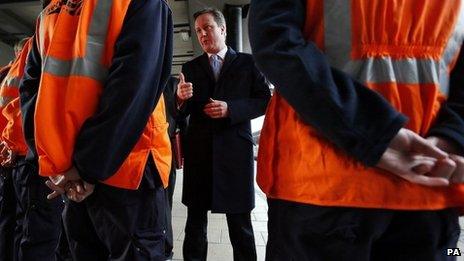
David Cameron met Network Rail apprentices on the day of the announcement
Rail industry
David Higgins, chief executive of rail infrastructure company Network Rail, said: "A new high-speed network is as essential to Britain's prosperity as it is to the railway. The railways don't just move people and freight; they create jobs, connect economic centres and open up new markets.
"More people use the railways today than at any time since the Second World War, on a network half the size it was then.
"Without HS2, the West Coast Main Line - our busiest and most economically important line - will be full in a little over a decade. This is a rare chance to stop playing catch-up on capacity."
Bob Crow, general secretary of the Rail Maritime and Transport Union, said: "The modernisation and expansion of rail in the UK is many years overdue and while the RMT welcomes any belated investment and development, we must not forget that it is decades of political inertia that have left Britain's railways in the slow lane.
"We must make sure we don't fall for the old political trick of rail staff cuts and high fares today on the promise of high-speed jam tomorrow."
Manuel Cortes, leader of the Transport Salaried Staffs Association, said it welcomed the "huge investment" in high-speed rail travel, arguing it would bring much-needed economic re-generation to the Midlands and the North of England.
"But we don't want this service to be so expensive that ordinary families will not be able to use it to get around the country quickly and at affordable prices. Everyone is going to pay for this with higher taxes, so everyone should be able to use it."
Business
Dr Adam Marshall, director of policy at the British Chambers of Commerce, said: "Business welcomes the prime minister's commitment to extending high-speed rail to the great cities of the Midlands and the North. Transformative infrastructure projects like HS2 create confidence, jobs and competitiveness, as long as commitments and announcements lead swiftly to action on the ground.
"Our existing railway network is at capacity and cannot be endlessly patched up at astronomical cost, as opponents of HS2 continue to suggest."
John Cridland, director general of the CBI, said: "We cannot sit on our hands when the West Coast Main Line is set to reach full capacity by the 2020s and freight will be squeezed.
"Extending HS2 to the North is the project's big prize. It will boost the economic potential of some of our biggest cities, driving growth and creating jobs across the country."
Corin Taylor, senior economic adviser at the Institute of Directors, said: "Air and rail needs to be much better connected, and so it is very welcome to see the Y-network serving Manchester Airport directly.
"By the same token, it is disappointing to see a direct connection to Heathrow left out altogether. If the Davies Commission recommends that Heathrow should remain the UK's main hub airport, then the first section of HS2 ought to run through Heathrow, not around it."
Steve Radley, policy director at manufacturers' organisation EEF, said the government must now demonstrate it had a "credible plan" to deliver HS2 on time.
"This would send an important signal to business about Britain as a place to invest," he said. "Government must also ensure that as many as possible of the benefits associated with HS2 are realised by businesses based in Britain."
- Published28 January 2013
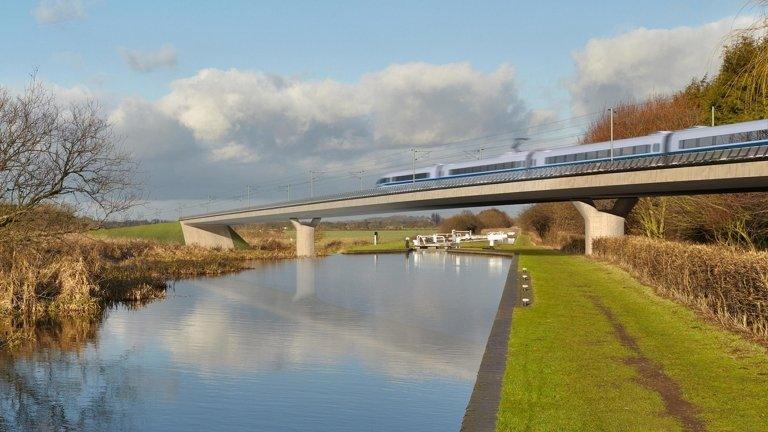
- Published28 January 2013
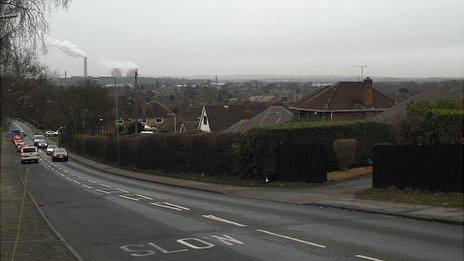
- Published6 October 2023
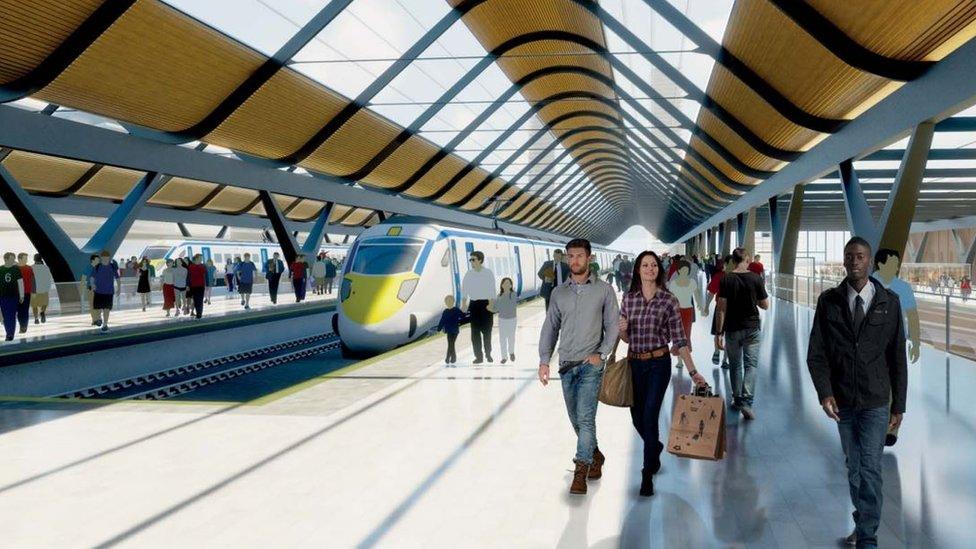
- Published28 January 2013

- Published28 January 2013
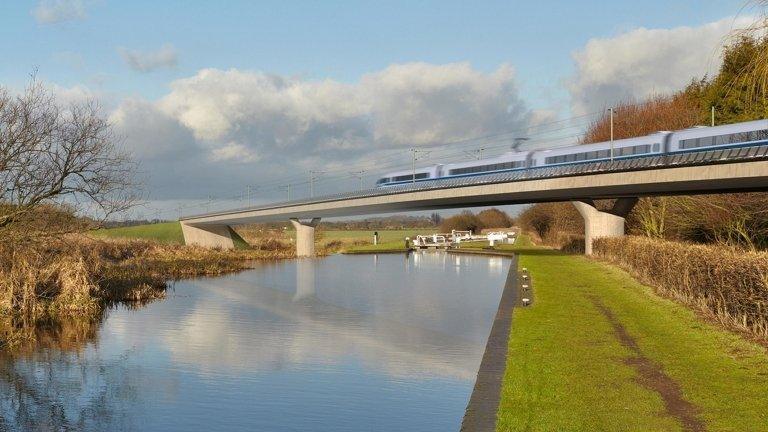
- Published28 January 2013
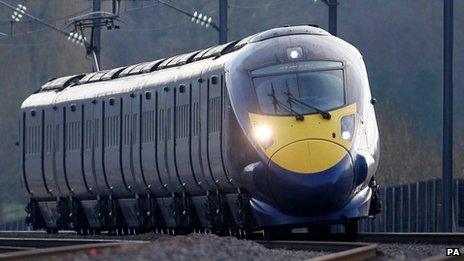
- Published28 January 2013

- Published28 January 2013

- Published28 January 2013
